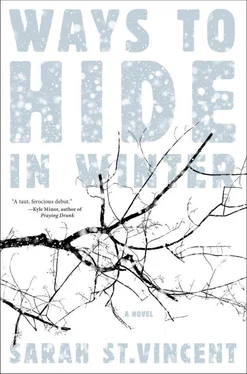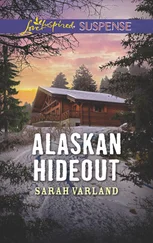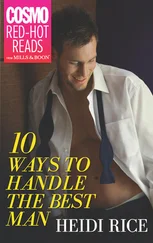To my shock, he called the next day, and for weeks we talked almost every night, when I was home from school and he was back from his job as a mason’s assistant in Mechanicsburg. I would sit on the carpet in my room, leaning against the closet door, the phone pressed to my ear, smiling as he told stories about his boss, the customers, life in a town that was big enough to have things like bars and traffic jams. When I hung up, my fingers would be stiff from gripping the receiver while I listened, trying desperately to think of something interesting to say in response.
“Amos Guttshall?” my brother said with disbelief when I told him. I was sitting on the edge of his bed, watching him stuff shorts and a T-shirt into a duffel bag before basketball practice. We had the same dark hair and slender build, but it looked better on him; girls loved the way his blue eyes and black cowlick stood out against his skin, with an air of innocence and daring at the same time.
“Yeah,” I said, pulling up my leg and picking at the rubber toe of my hi-top sneaker. “Why?”
“Nothing,” he said.
I would think about it later, that “nothing.” What was behind it, really? Why wasn’t I supposed to know?
At the time, all he said was, “He’s okay. Little bit funny, though. His parents are rich—I mean, not rich, but his dad sells houses and his mom’s some kind of counselor. They’re doing pretty well for themselves, but you’d think the guy didn’t know his ass from a hole in the ground. Acts like he’s the biggest born redneck who ever walked the face of the earth.”
“I think he’s smart,” I said. At least, he sounded smart over the phone.
“Oh, he’s smart enough. He just doesn’t want anybody to know it.” He waited for me to slide off the bed so he could turn off the light. “What’s he doing now?”
“Mason,” I told him.
He whistled appreciatively. “Ooh, my little sister’s bagged herself a union man,” he said, sauntering out of the room, ignoring my protests.
Before I knew it, my friend Melanie—a tall girl who ran track—was sewing me into a homecoming dress, a long black velveteen sheath she’d worn the year before. The hairdresser had curled our hair and woven primroses into it, and when I looked in the bathroom mirror at Melanie’s house I was taken aback by the slightly sunburned but elegant brunette who stared back at me.
“I told you,” Melanie said, leaning forward and applying a bright swath of red lipstick to her lips with practiced motions.
“Told me what?”
“That you could be pretty.”
In spite of the cool fall weather, we drove into town to the ice cream place, the one that still looked exactly the way it had in the 1960s, and ordered vanilla milkshakes in lieu of dinner. I had never worn high heels before and was taking short steps back and forth across the parking lot, trying not to dwell on the thought that in a few hours I would be dancing in these things, turning in circles while pressed against the body of a man I barely knew. Melanie had struck up a conversation with a guy in a Camaro, someone she knew from track. I was beginning to worry that we would be late when I pivoted painstakingly and, looking up, saw Amos.
He was sitting in a truck that was parked across the road, leaning out of the window and beckoning to me. My stomach flipped; he wasn’t supposed to see me yet, not until we met up at the school, where someone was going to have to sneak him in since he’d already graduated. I walked toward him, praying I wouldn’t trip over the hem of the dress.
“Hey,” he said. His eyes seemed luminous, and a warm, sweet odor of sweat mingled with cigarette smoke rose from his skin. He was wearing a gray work shirt with the masonry company’s logo on it, and his hands and forearms were lined with the short scrapes I would come to know so well, the ones that came from the edges of stone. “Listen. Do you still want to go to this dance?”
“I. Well. Why?” I blurted out.
“I mean, we can if you want to. But I was thinking you might want to do something else instead.”
“Like what?” Melanie had covered my eyelids with a vast amount of green powder, and I found myself blinking at him.
“I don’t know.” He tapped his fingers on the wheel and looked through the windshield. “Have you been up to Waggoner’s Gap? I was thinking we could just talk. You know. Since we’ve never done that. Not in person, I mean.” Although his sentences were fumbling, there was a sincerity in his face, a kind of intelligence that seemed to find difficulty compressing itself into words.
“All right,” I said slowly, and shortly afterward found myself sitting next to him at the gap, on North Mountain, looking out over Carlisle’s web of lights in the darkness while talking in quiet, halting tones about our lives. I will remember this, I thought at the time, and I did. The country station on the radio playing its Saturday-night classic songs, the towns below us glittering like scattered cinders. It was like the movies; it was, I thought, how it was supposed to be. Sitting there, I felt as if the whole thing were magic, something I didn’t deserve, but I also felt like I’d achieved something. Like I should carry it forward so it could keep being the perfect story it was.
It’s amazing, the power of a story.
We were married not long after I graduated, on a bright summer day a few months before I started classes at the state college in Shippensburg. Amos kept his job in a town forty-five minutes away, his hands perpetually covered with dust, the scrapes gradually forming small, light-colored scars. From the first, I decided I was going to be good, a good wife, that the marriage was going to be a success. Even through the haze of my nervous happiness, I had seen the glances at our wedding, at my pointed seventeen-year-old elbows poking out of the frilly, adult-looking gown my grandfather had insisted on buying for me. Amos’s mother, for one, had cried so much during the ceremony that I’d begun to be embarrassed. But I was as sure about Amos as I had ever been about anything. To the extent that I even acknowledged the glances, I was set on proving them wrong.
As I propped my feet up on the porch and thought about these things—or tried not to—the stranger would usually appear, also with a book in tow, scarf looped gently around his mouth and nose. If one of the hunters showed up, he would quietly slip away, but often we sat together for hours, the table between us, lost in our own thoughts. He was mostly silent, but I could sense him, sitting there with his eyes calmly lowered, occasionally turning a page. As the days passed, I found that I didn’t mind his presence, that in some way it helped to keep the ghosts of the past at bay. Like me, he would sometimes look up, his hand marking his place, and stare out over the mountains. Maybe both of us, I thought, found each other’s company useful for the same reasons. I still wasn’t used to spending so much time with another person, but it didn’t seem to hurt either of us to have someone there who could keep us from sinking into the backwards pleasure of tormenting ourselves, dwelling with astonishment and regret on the hours that had passed us by and the people we used to be.
He found an old book of crossword puzzles and set about solving them whenever he joined me, leaning across the table from time to time to ask questions. Looking into his face, so open and somehow sensitive, I could never bring myself to ask him about the bad thing he said he had done. He was here illegally, I understood that much, but I decided the rest didn’t matter. It wasn’t for me to ask questions, and besides, the past was the past; if that could be true for me, then it could also be true for him.
Читать дальше












